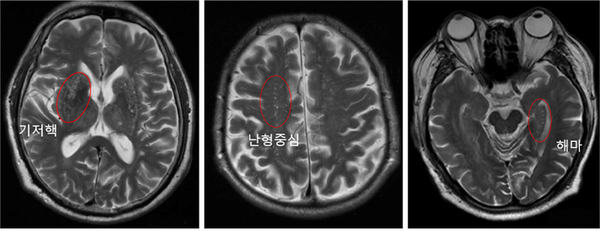
A Korean research team has released a study result that confirmed the association between perivascular space dilation and cognitive decline in Alzheimer’s patients.
The team analyzed the results of amyloid PET imaging and MRI brain imaging in Alzheimer's patients and published the results in the October issue of the international academic journal Neurology.
Three neurologists - Professors Cheong Seung-ho of Inje University Sanggye Paik Hospital, Jung Suk-jong of Yongin Severance Hospital, and Lee Pil-hyu of Severance Hospital – led the study.
Perivascular space dilation is commonly found during brain MRI, occurring when there is a problem with the brain's ability to clean up waste and toxins.
Researchers confirmed the degree of perivascular space dilation by analyzing the MRI scans of basal nuclei, ovoid centers, and hippocampus of 208 patients with confirmed amyloid deposition through amyloid PET imaging at Severance Hospital.
Also, they analyzed the relationship between perivascular space dilation and the speed of cognition point decline in 158 patients who underwent the “mini-mental state exam” twice or more with an interval of one year.
As a result, they confirmed the cognition points of patients with a severe degree of perivascular space dilation with ovular central area dropped faster than other patients by 0.58 points.

The researchers explained that diagnosing the degree of perivascular space dilation can help predict the prognosis of cognitive declines in Alzheimer’s patients and control its progress.
“Previous studies had discovered the association between perivascular space dilation and Alzheimer’s. However, our study is significant because it disclosed the relationship between perivascular space dilation and cognitive decline through the longitudinal analysis of patients confirmed with Alzheimer’s for the first time,” Prof. Cheong said.
Prof. Jung said, “Perivascular space dilation is an image that brain MRI can easily confirm. Therefore, we expect to predict relatively easily prognosis related to cognitive function when treating patients with Alzheimer's disease.”
Prof. Lee said, “The occurrence of perivascular space dilation means there is a problem with the brain's ability to clean up waste and toxins. This suggests that targeted treatments can help curb the progression of Alzheimer's disease.”

